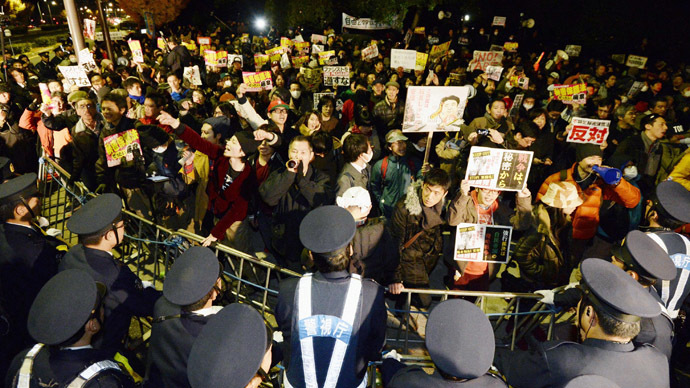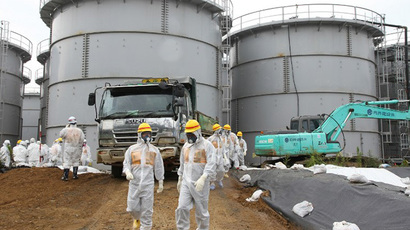Japan enacts controversial state secrets law

Japan has enacted a new law to increase punishment for leaks, despite growing worries that the state-secrets law will erode press freedoms.
Last week Japan’s lower house of parliament gave the greenlight to the new legislation, which counts the support of conservative prime minister Shinzo Abe, who has said the measure is necessary to combat the leak of state secrets.
Abe and members of his cabinet have said that the law will help mend the government’s reputation for leaks and facilitate the sharing of intelligence with the US.
"We think that this law is extremely important for our connections with our allies and other foreign nations," said chief cabinet secretary Yoshihide Suga. "I believe that people will come to understand."
According to a survey by Asahi Shimbun 61 percent of Japanese voters believe the law is “problematic,” and it has garnered the opposition of the media, publishers and the country’s lawyers. Opposition parties even mounted a challenge to the new bill, which was passed during a late-night session of the country’s upper chamber.
Members of the opposition raised motions to stop or delay the law but were overruled by members of the ruling Liberal Democratic Party and its allies.
The new law enacts harsher sentences for public servants and others with access to sensitive national information, and could lead to jail terms of up to ten years. Meanwhile, journalists in the country could face up to five years imprisonment if the state determines the use of “grossly inappropriate” means to acquire state secrets.
Officials in Japan’s ministries will now be given the authority to designate state secrets in four categories: defense, diplomacy, counterterrorism and counterespionage. Such a classification will allow information be kept secret for up to 60 years or longer.
Still, opposition to the new legislation has come from a wide variety of sectors. Takao Takeda, a Buddhist monk and the secretary of the multi-faith organization Shukyosha Kyujo-no-wa, said that the bill echoed Japan’s authoritarian past.
"The bill being discussed now seems very similar to the Public Order Preservation Law" enacted in 1925, Takeda told AFP. That law enabled Imperial Japan to arrest anyone who voiced a dissenting view against the government, said Takeda.
"It is important to protect people's rights to know given our history and the way information was hidden in (World War II) and the fact that the government was not very open in the face of the [Fukushima] nuclear crisis."
Likewise, Japan’s media has also protested the new law.
"It is a threat to democracy," said Keiichi Kiriyama, editorial writer of the Tokyo Shimbun. The state-secrets law would "have a chilling effect on public servants who could become wary about giving the information" sought by journalists, he added.
Prime Minister Abe has said that the law is necessary to bolster the country’s security, in tandem with the creation of a new National Securities Council and cooperation with the US amid concerns over China’s growing military projection.
Critics worry that the new legislation lacks checks and balances as to how the state will define a secret, while Abe has said that his government will set up panels to legitimize that process.














